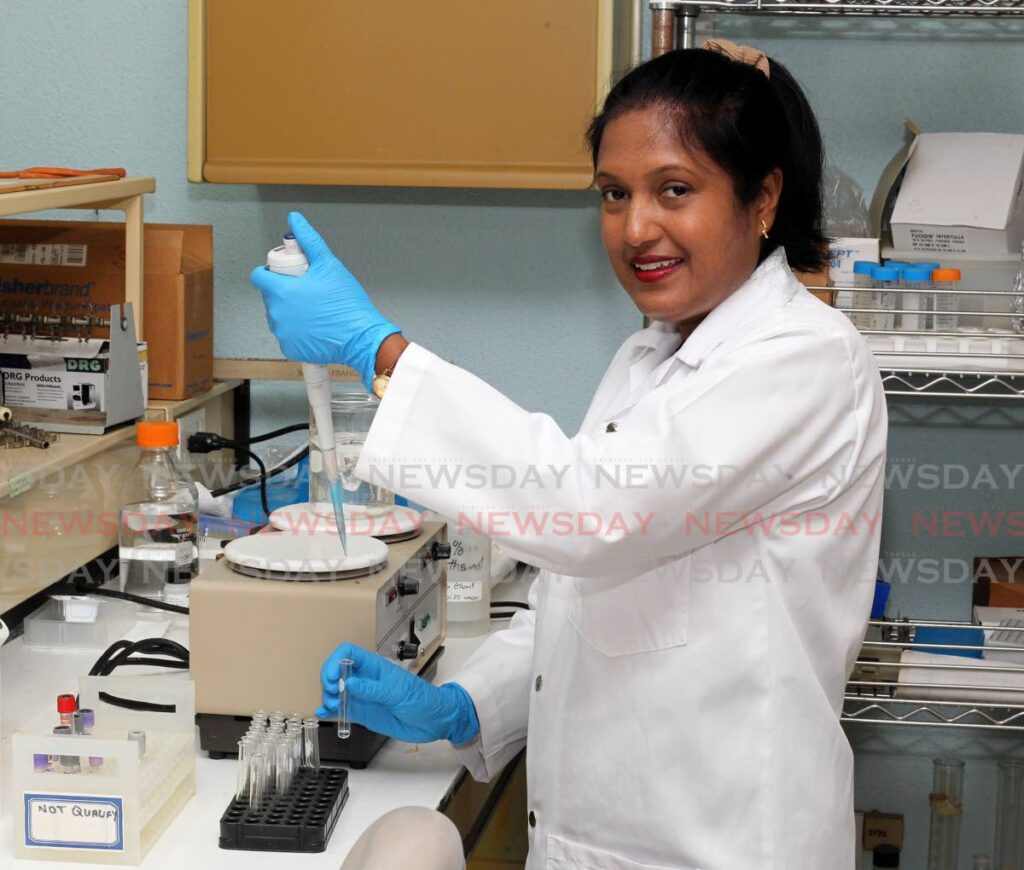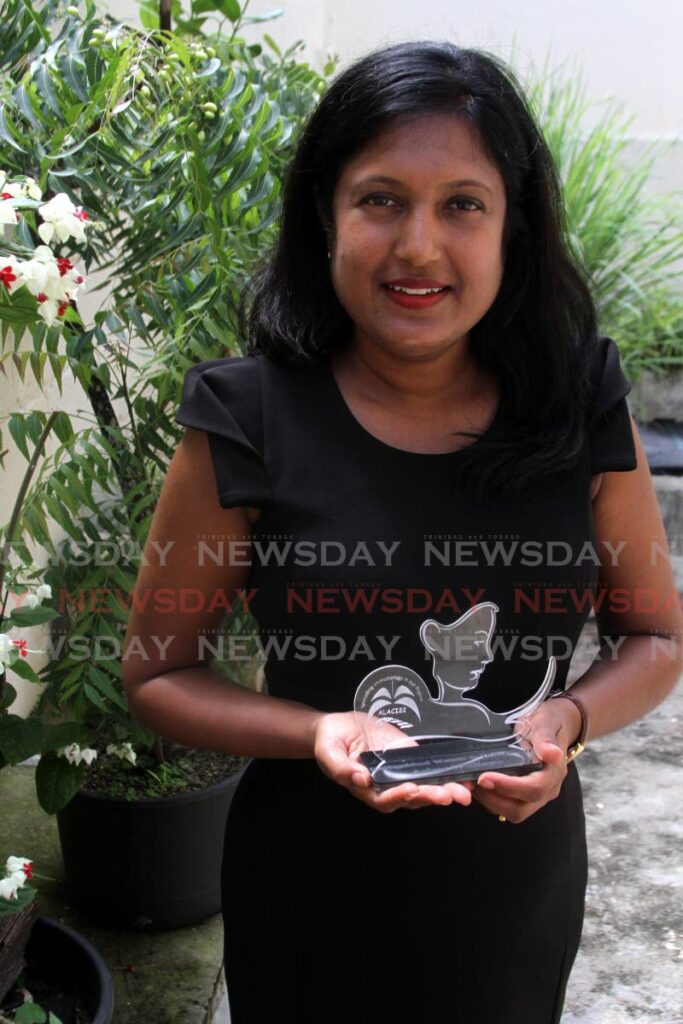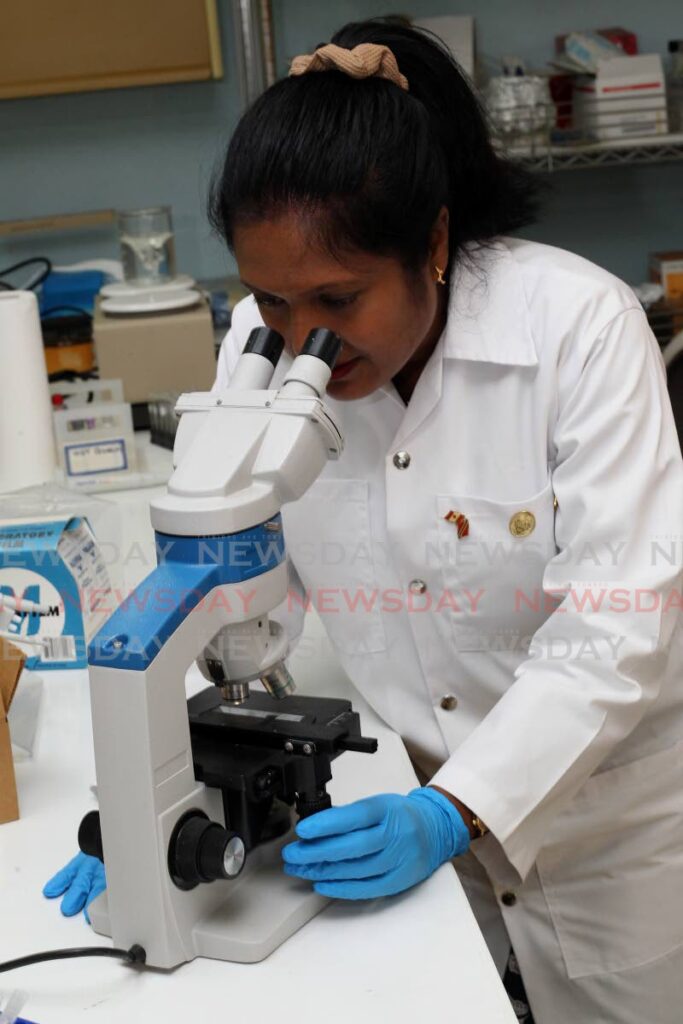Dr Arlene Williams-Persad leads research on ways to help the body fight diseases

Dr Arlene Williams-Persad wants people to know it does not matter where they start in life or what setbacks they may have to overcome, with hard work they can achieve their goals.
She attended St Joseph’s Girls' RC School, Curepe Junior Secondary, and St Augustine Senior Comprehensive before attending UWI. She is now a pharmacologist and a lecturer in pharmacology at the university's Faculty of Medical Sciences, St Augustine campus.
She is also the treasurer of the West Indian Immunology Society (WIIS), a 5K runner, and one of nine women awarded the prize of Distinguish Woman in Immunology at the Latin American and Caribbean Association for Immunology’s 13th Latin American and Caribbean Congress of Immunology (ALACI 2022) in Cuba.
“I’m very proud of my pathway. I want more flowers to blossom through the government school system.”
Williams-Persad, 46, represented UWI and WIIS at ALACI2022, which took place from June 6-10 at the Meliá Internacional, Varadero, Cuba.
Held every three years, the congress brings together researchers in Latin America and, more recently, the English-speaking Caribbean in the discipline of immunology and related sciences, and encourages younger people to get involved in research.
There she presented on the topic of the Treatment and Management of Chronic Granulomatous Disease (CGD) – a rare inherited disorder. It was the first time TT was represented at the conference and the first English-speaking Caribbean country to be represented.
She said she presented at the last WIIS symposium in April and through that symposium, was invited to present at ALACI2022.
The WIIS was formed in February 2021 and its members were students and academic staff at UWI and clinical staff at various regional health authorities.
Williams-Persad said one in 250,000 people are born with CGD annually in the US and Italy, while the statistic was one in 20,000 in developing countries.

She said there is a high risk of people dying of CGD if they have tuberculosis as they were highly susceptible to viral infections because of a mutation in the NADPH oxidase (nicotinamide adenine dinucleotide phosphate oxidase) enzyme, one of the proteins in immune cells.
She and her colleagues would like to look closer at the defect in the NADPH oxidase enzyme.
“In addition to improving the quality of treatment – there is a new stem cell technique to help improve and reverse the protein – we want to look at this NADPH oxidase closer in our lab and maybe see if, in other inflammatory diseases or neurodegenerative disorders like alzheimer's and parkinson's, this defect might be useful, or if there may be a drug to suppress that NADPH oxidase to alter that function and help those patients.”
She said the diseases were the result of oxidative stress.
“When there is a bacteria or fungus present in cells, the NADPH oxidase becomes activated, forms a super oxide, something like bleach, inside the cell to dissolve the bacteria or fungus and heals us.”
The super oxide molecules formed were pro-oxidants and, if there were too many in the body, they caused oxidative stress which damages or kills cells. People with neurodegenerative and inflammatory diseases were found to have too many pro-oxidants so, if oxidative stress is stopped, it could slow down the disease.
Williams-Persad told WMN she got involved in immunology about two years ago when she and her colleagues at UWI started to look into how pharmacology and immunology worked together.
UWI lecturer and president of the WI Immunology Society, Angel Justiz Vaillant, introduced her to CGD. In studying the pathology of the disease, they found very little work had been done on it over the past five years. So, they continued the work and found there were promising treatments, stem cell transplants, which were still in the testing stages but which were only used on severe cases.
They published a paper on available treatments.
“The NADPH oxidase enzyme in this rare disorder triggered my interest because I am very interested in drug development and CGD gave us the key to try to see how we could use it in healthy humans who suffer from other conditions.
“Also, I’m interested in anti-inflammatory drugs because my mother has very severe arthritis. We’re using painkillers all the time and it would be nice to see if we could find some other agent that would prevent the whole process from happening or reverse it instead of just treating the pain.”
Williams-Persad said her father was in the trade union movement and wanted her to go into business but she always liked the beach, plants and animals. Also, when she was younger, one of her family members studied biochemistry at UWI. She admired her intelligence and wanted to follow in her footsteps so she did.
However, since she did not know what she wanted to do other than biochemistry, she also did several courses in botany, human resources, psychology, food preservation and more. While studying, she worked as a lab technician in the Faculty of Medical Sciences where she did some research as she worked with lecturers and professors.

“The work of some of the professors interested me and I became involved in pharmacology and research in pharmacology. That’s how we ended up doing the research in herbal medicine and looking at animal experiments as a technician.
“People claim herbs have benefits to healing – for fertility, arthritis, diabetes, and all sorts of conditions. But when we take these agents into our bodies as a medicine at different quantities, sometimes we damage other vital organs such as the liver and kidneys.
“So what I did was, I chose certain plants that showed promise, such as the chandelier – they use it for the flu, jaundice and all that – because I wanted to see what effect it had on the liver, taking it orally, the way it was prepared by your grandmother.”
Taking into consideration that the liver could regenerate itself up to a certain point, she found that, in one type of preparation and in certain doses, chandelier protected the liver and, in the case of a damaged liver, helped reverse damage.
“The University of the West Indies is an educational institution and I am one of the examples of that. You can work there and you are allowed to educate yourself once you’re willing. My studies were directly related to the work I was doing so I benefited on both sides. I earned my PhD through being a technician.”
Before getting her PhD, however, she studied at the University of Toronto, Canada as a Caricom exchange student and was trained in various pharmacology techniques. She returned in 2009 and was promoted to a research technician then, in 2012, she started as a part-time lecturer as part of her training.
She gained her PhD in pharmacology in 2013 and remained an associate lecturer and continued doing research until 2017 when she got a lecturing post.
“It was fun. I couldn’t see myself doing anything else. I love pharmacology, I love biochemistry, and I think I’m developing a passion for immunology. And I want to tie all the disciplines together and see what we could contribute to society.”
Williams-Persad added that her trip to Cuba was enjoyable and eye-opening, leading her to believe both TT and Cuba could mutually benefit from a stronger medical relationship.
She said the Cuban government invested a lot in medical research resulting in excellent clinicians and healthcare. She suggested Cubans could provide training while TT could help provide them with pharmaceutical drugs.
“TT have wonderful doctors who are well-trained but we are trained in a bubble. It’s time to expand. There is so much being done outside and we are being left behind.”
In addition, she said she met the Cuban Ambassador to TT, Tania Diego Olite, when she went for her tourist visa and she too believed the countries could work together to improve healthcare in both lands.
They would like to see more interactions as, later this year, Cuba would be hosting a trade fair called Health For All, as well as the Cuban Health 2022 international convention, which Williams-Persad hopes to form a delegation of clinicians to attend.


Comments
"Dr Arlene Williams-Persad leads research on ways to help the body fight diseases"